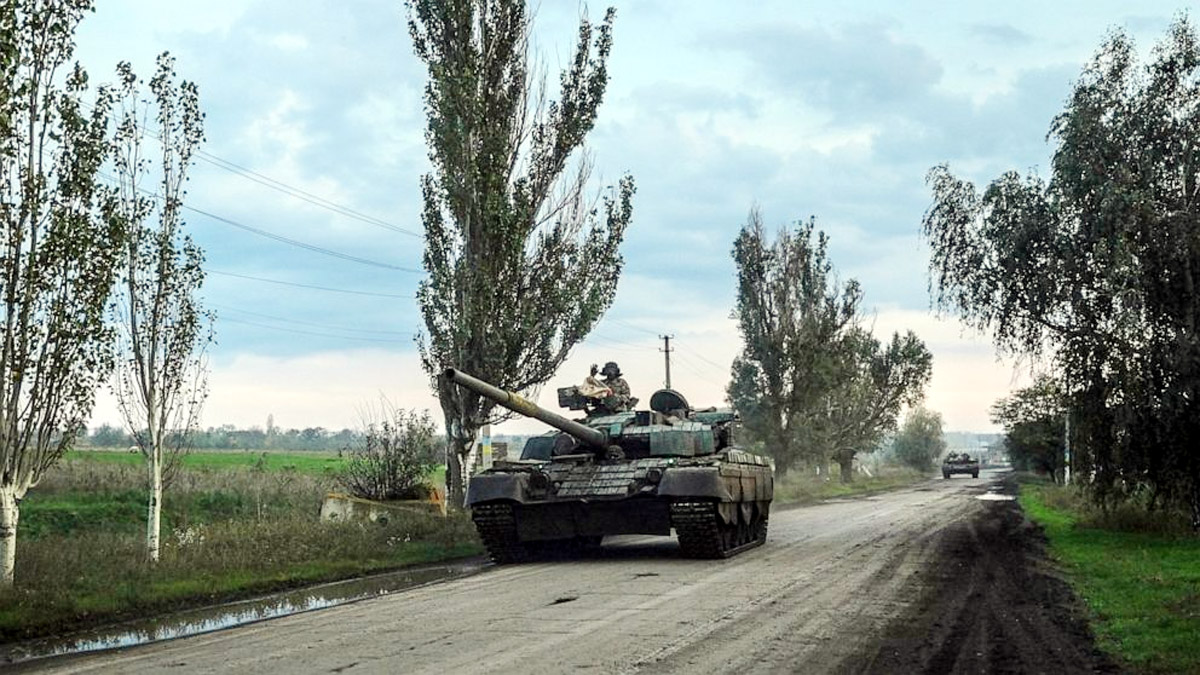Kyiv, Oct 2: Russia attacked the Ukrainian president’s hometown and other targets on Sunday with suicide drones, and Ukraine took back full control of a strategic eastern city in a counteroffensive that has reshaped the war.
Russia’s loss of the eastern city of Lyman, which it had been using as a transport and logistics hub, is a new blow to the Kremlin as it seeks to escalate the war by illegally annexing four regions of Ukraine and heightening threats to use nuclear force.
Russian President Vladimir Putin’s land grab has threatened to push the conflict to a dangerous new level.
It also prompted Ukraine to formally apply for NATO membership, a bid that won backing on Sunday from nine central and eastern European NATO members fearful that Russia’s aggression could eventually target them, too.
Ukrainian President Volodymyr Zelenskyy announced Sunday that his forces now control Lyman: “As of 12.30 pm (0930 GMT) Lyman is cleared fully. Thank you to our militaries, our warriors,” he said in a video address.
Russia’s military didn’t comment on the situation in Lyman on Sunday, after announcing Saturday that it was withdrawing its forces there to more favorable positions.
The British military described the recapture of Lyman as a “significant political setback” for Moscow. Taking the city paves the way for Ukrainian troops to potentially push farther into Russian-occupied territory.
In southern Ukraine, Zelenskyy’s hometown of Krivyi Rih came under Russian attack by a suicide drone that destroyed two stories of a school early on Sunday, said Valentyn Reznichenko, governor of Ukraine’s Dnipropetrovsk region.
Russia in recent weeks has begun using Iranian-made suicide drones to attack targets in Ukraine.
In southern Ukraine, the Ukrainian air force shot down five Iranian-made drones overnight, while two others made it through air defences.
A car carrying four men who wanted to forage for mushrooms in a forest in Ukraine’s Chernihiv region struck a mine, exploding the vehicle and killing all those inside, local authorities said on Sunday.
Russian attacks also targeted the city of Zaporizhzhia, Ukrainian authorities said on Sunday. Ukraine’s military carried out strikes on multiple Russian command posts, ammunition depots and two S-300 anti-aircraft batteries.
The reports of military activity couldn’t be immediately verified.
Ukrainian forces have retaken swaths of territory, notably in the northeast around Kharkiv, in a counteroffensive in recent weeks that has embarrassed the Kremlin and prompted rare domestic criticism of Putin’s war.
Lyman, which Ukraine recaptured by encircling Russian troops, is in the Donetsk region near the border with Luhansk, two of the four regions that Russia illegally annexed on Friday after forcing what was left of the population to vote in referendums at gunpoint.
In his nightly address Saturday, Zelenskyy said: “Over the past week, there have been more Ukrainian flags in the Donbas. In a week there will be even more.”
In a daily intelligence briefing, the British Defence Ministry called Lyman crucial because it has “a key road crossing over the Siversky Donets River, behind which Russia has been attempting to consolidate its defences.”
The Russian retreat from northeast Ukraine in recent weeks has revealed evidence of widespread, routine torture of both civilians and soldiers, notably in the strategic city of Izium, an Associated Press investigation has found.
AP journalists located 10 torture sites in the town, including a deep pit in a residential compound, a clammy underground jail that reeked of urine, a medical clinic and a kindergarten.
Russian officials release limited information about military activity in what the Kremlin still refuses to call a war.
They routinely claim that Russia exclusively targets Ukrainian military forces, the foreigners supporting them or Western-supplied weaponry.
Putin frames the Ukrainian gains as a US-orchestrated effort to destroy Russia, and last week he heightened threats of nuclear force in some of his toughest, most anti-Western rhetoric to date.
Recent developments have raised fears of all-out conflict between Russia and the West.
The leaders of Czechia, Estonia, Latvia, Lithuania, North Macedonia, Montenegro, Poland, Romania and Slovakia issued a joint statement backing a path to NATO membership for Ukraine, and calling on all 30 members of the US-led security bloc to ramp up military aid for Kyiv.
German Defence Minister Christine Lambrecht, meanwhile, on Sunday announced the delivery of 16 wheeled armoured howitzers produced in Slovakia to Ukraine next year.
The weapons will be financed jointly with Denmark, Norway and Germany,
Russia on Sunday moved ahead with steps meant to make its land grab look like a legal process aimed at helping people persecuted by Ukraine, with rubber-stamp approval by the Constitutional Court and draft laws being pushed through the Kremlin-friendly parliament.
Outside Russia, the annexation has been widely denounced as violating international law.
Meanwhile, international concerns are mounting about the fate of Europe’s largest nuclear plant after Russian forces detained its director for alleged questioning.
The International Atomic Energy Agency announced on Sunday that its director-general, Rafael Grossi would visit Kyiv and Moscow in the coming days to discuss the situation around the Zaporizhzhia nuclear power plant.
Grossi is continuing to push for “a nuclear safety and security zone” around the site.
The Zaporizhzhia plant is in one of the four regions that Mos cow illegally annexed on Friday, and repeatedly has been caught in the crossfire of the war.
Ukrainian technicians have continued running the power station after Russian troops seized it, and its last reactor was shut down in September as a precautionary measure.
Pope Francis on Sunday decried Russia’s nuclear threats and appealed to Putin to stop “this spiral of violence and death.” (AP)
Trending Now
E-Paper


